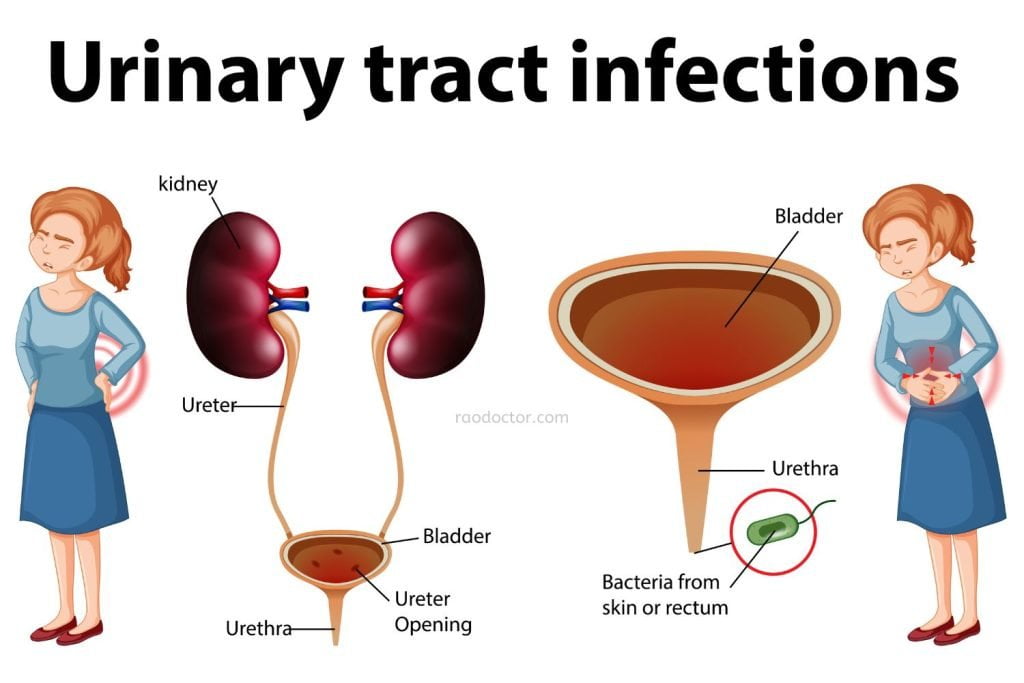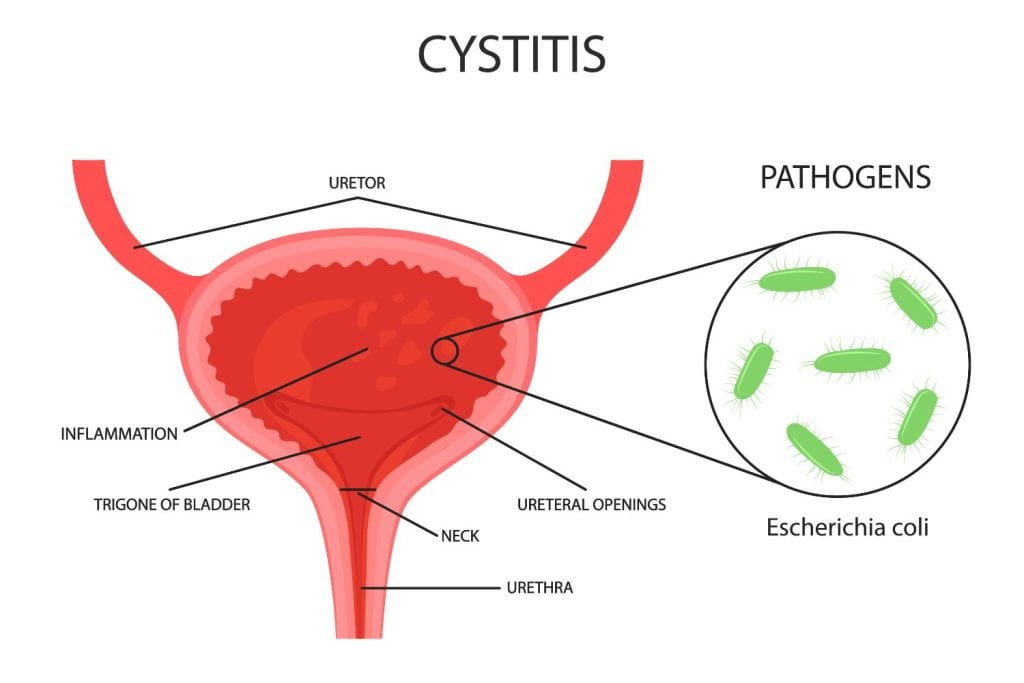Urinary Tract Infections

Image Source: Freepik Designed on Canva Pro
Urinary tract infections (UTIs) are very common and can affect anyone, regardless of age or gender. One in ten people will experience a UTI at some point in their lifetime. Urinary tract infections are a type of bacterial infection that affects the urethra, bladder, and kidneys. They are more common in women than men because of structural differences in the urinary tract. In this article, you will learn all about urinary tract infections and how to spot the early signs so you can get treatment as fast as possible.
In my last article on Kidneys, at the end I had mentioned that my next article will be on urinary tract infection
What is a Urinary Tract Infection?
A urinary tract infection is a bacterial infection that affects any part of the urinary system. This includes the kidneys, ureters (the tubes that carry urine from the kidneys to the bladder), bladder, and urethra (the tube that carries urine out of the bladder).
Urinary tract infections are very common and can affect anyone, regardless of age or gender. One in ten people will experience a UTI at some point in their lifetime. UTIs are usually caused by bacteria entering the urethra and traveling up to the bladder, causing an infection.
Bacteria can enter the urinary tract through microorganisms in the air, sexual intercourse, or inadequate hand hygiene.
How do you get a UTI?
Urinary tract infections are a type of bacterial infection that affects the urethra, bladder, and kidneys. They are more common in women than men because of structural differences in the urinary tract.
Common bacteria that cause UTIs are E. coli, Staph and Klebsiella. UTIs are usually caused by bacteria entering the urethra and traveling up to the bladder, causing an infection.
Bacteria can enter the urinary tract through microorganisms in the water used for cleaning genitals, sexual intercourse, or inadequate hand hygiene.
If the infection is not treated, it can travel up to the kidneys and cause an infection there as well. This is known as pyelonephritis, and it can be very serious and may require antibiotics to treat the condition.
UTI Symptoms to Look Out For
Urinary tract infections are very common and can affect anyone, regardless of age or gender. One in ten people will experience a UTI at some point in their lifetime.
Urinary tract infections are a type of bacterial infection that affects the urethra, bladder, and kidneys. They are more common in women than men because of structural differences in the urinary tract.
Signs and symptoms
Depending on which part of your urinary system is affected, the signs and symptoms can be as follows: –
Kidneys: –
In the kidneys, bacterial infection causes pus to form and collect in the kidneys. This condition is called pyelonephritis. This is how a kidney infection usually presents-
- Dull ache or pain in loins
- Fever
- Urge to urinate frequently
- Burning sensation while urinating
- Foul smell to the urine
Ureters
The ureters are next to be infected after the kidneys. Most of the time, the infection trickles down from the kidney above or it may travel up from the bladder.
Another important cause is kidney stones getting stuck in the ureter, causing minute scraping to the internal wall while passing down. These minute wounds can get infected by bacteria.
The signs and symptoms are the same as above for kidney infection. Plus, the pain may be very severe, come in spasms [called colicky pains], and may cause nausea and vomiting.
The pain most often radiates from the loins to the front of the abdomen, reaching the scrotum in males and pelvis in females.
Bladder
This condition is called cystitis. Bladder UTIs are usually caused by bacteria entering the urethra and traveling up to the bladder, causing an infection. This is more common in men who have prostatitis who have urine retention[as seen in image below] due to prostate inflammation.

Bacteria can enter the urinary tract through microorganisms in the water used for cleaning after passing stools, sexual intercourse, or inadequate hand hygiene.
If the infection is not treated, it can travel up to the kidneys and cause an infection there as well. This is known as pyelonephritis [as explained above], and it can be very serious and may require antibiotics to treat the condition.
The most common symptom is pain and fullness of bladder. The inflammation of cystitis can narrow down the opening to the urethra. Other sign/symptoms are same as for kidney infection.
In case the bladder infection has not been treated properly, the infection becomes chronic and can cause changes in the bladder wall as shown below-
Sometimes urinary stones can get stuck at the point where bladder is connected to the urethra leading to retention of urine in the bladder and causing infection and inflammation.
Urethra
The infection of urethra is called urethritis. The most common symptom of urethritis is pain and burning sensation while passing urine. Plus, all other signs and symptoms of kidney and bladder infection.
Urethra is a tube that expels our urine collected in the bladder. The urethra in men is longer than women. Hence, women are more prone to UTIs than men because of their proximity of the anus and vagina. If proper hygiene of vagina is not maintained after intercourse, women can get infected more frequently than the men.
How Do You Know if You Have a UTI?
If you experience any of the UTI symptoms mentioned above, you should make an appointment to see your doctor. The doctor will ask you about your symptoms, your medical history, and any recent events that may have triggered the infection.
He or she will also perform a simple urine test- urine routine and microscopic– to check for any signs of infection. If the test comes back positive, you will most likely be prescribed antibiotics. Learn all about urine tests here-
You should also see your doctor if you have any other symptoms that are not listed above, such as vomiting or diarrhea, blood in your urine, pain in your abdomen or pelvis, or a high fever.
Tips to Prevent Urinary Tract Infections
Drink plenty of water – Drinking plenty of water will help flush bacteria out of your system. Make sure you drink at least eight glasses of water per day to help prevent infections.
Wash your genitals immediately after coitus -this will prevent UTI in most cases.
Make sure that water does not splash on your genitals while washing after attending nature’s call. This happens most of time s in women.
Risk Factors for UTIs
Urinary tract infections are very common and can affect anyone, regardless of age or gender. One in ten people will experience a UTI at some point in their lifetime.
If you experience frequent or recurring UTIs, your doctor may recommend that you undergo some tests to assess your susceptibility to infections.
These tests will help determine if you have an underlying condition that’s triggering recurrent infections. Common risk factors for UTIs include having sexual intercourse, using contraception, not drinking enough water, having diabetes or a weakened immune system, suffering from a urinary tract abnormality, or having a bladder or kidney stones.
Some medications used in treating diabetes can cause UTI as they excrete glucose through urine.
How to Treat a UTI
If you experience any of the UTI symptoms mentioned above, you should make an appointment to see your doctor. The doctor will ask you about your symptoms, your medical history, and any recent events that may have triggered the infection.
They will also perform a urine test to check for any signs of infection. If the test comes back positive, you will most likely be prescribed antibiotics.
You should also see your doctor if you have any other symptoms that are not listed above, such as vomiting or diarrhea, blood in your urine, pain in your abdomen or pelvis, or a high fever.
Your doctor may recommend that you take an antibiotic for a few days to treat the infection and clear up any traces of bacteria. You may also be advised to increase your fluid intake to help flush out bacteria and toxins.
Medications for UTI-
I usually prescribe these medicines for treating UTI patients-
- Norfloxacin 400 mg [NORFLOX, Noraday] 2 times a day for 5 to 7 days or
- Nitrofurantoin [Niftas, Nitrofur] 100 mg 2 times a day for 7 to 10 days
- Urine Alkalizer like Cital, Cital UTI, AVI UTI is also given to reduce burning sensation while passing urine.
- Paracetamol- [Calpol, Pacimol,] etc. to control fever
- Avil 25 3 times a day if there are chills with fever.
- Drotavarine [Drotin] if there is abdominal colic.
All these medicines are prescription medicines and should be had only after your doctor prescribes them.
Conclusion
Urinary tract infections are very common and can affect anyone, regardless of age or gender. One in ten people will experience a UTI at some point in their lifetime.
If you experience frequent or recurring UTIs, your doctor may recommend that you undergo some tests to assess your susceptibility to infections. These tests will help determine if you have an underlying condition that’s triggering recurrent infections.
Urinary tract infections are a type of bacterial infection that affects the urethra, bladder, and kidneys. They are more common in women than men because of structural differences in the urinary tract.
If you experience any of the UTI symptoms mentioned above, you should make an appointment to see your doctor. The doctor will ask you about your symptoms, your medical history, and any recent events that may have triggered the infection.
They will also perform a urine test to check for any signs of infection. If the test comes back positive, you will most likely be prescribed antibiotics.
You should also see your doctor if you have any other symptoms that are not listed above, such as vomiting or diarrhea, blood in your urine, pain in your abdomen or pelvis, or a high fever.
Useful Resource
Disclosure
Some of the links used in this article are affiliate links. i.e., if you sign up for their paid program or make a purchase, I will get a commission, at no extra cost to you. Please be rest assured that I only recommend software/ products I genuinely believe in, and trust to be good for you too.
If you have found this article useful, then please tweet it
A Guide to Urinary Tract Infections: What They Are, How to Diagnose and Treat Them Click To Tweet
Final Words
My next article will be on Kidney and ureteric stones. But before that, I will be publishing an article on Essential Vitamins for your good health.
Adios.